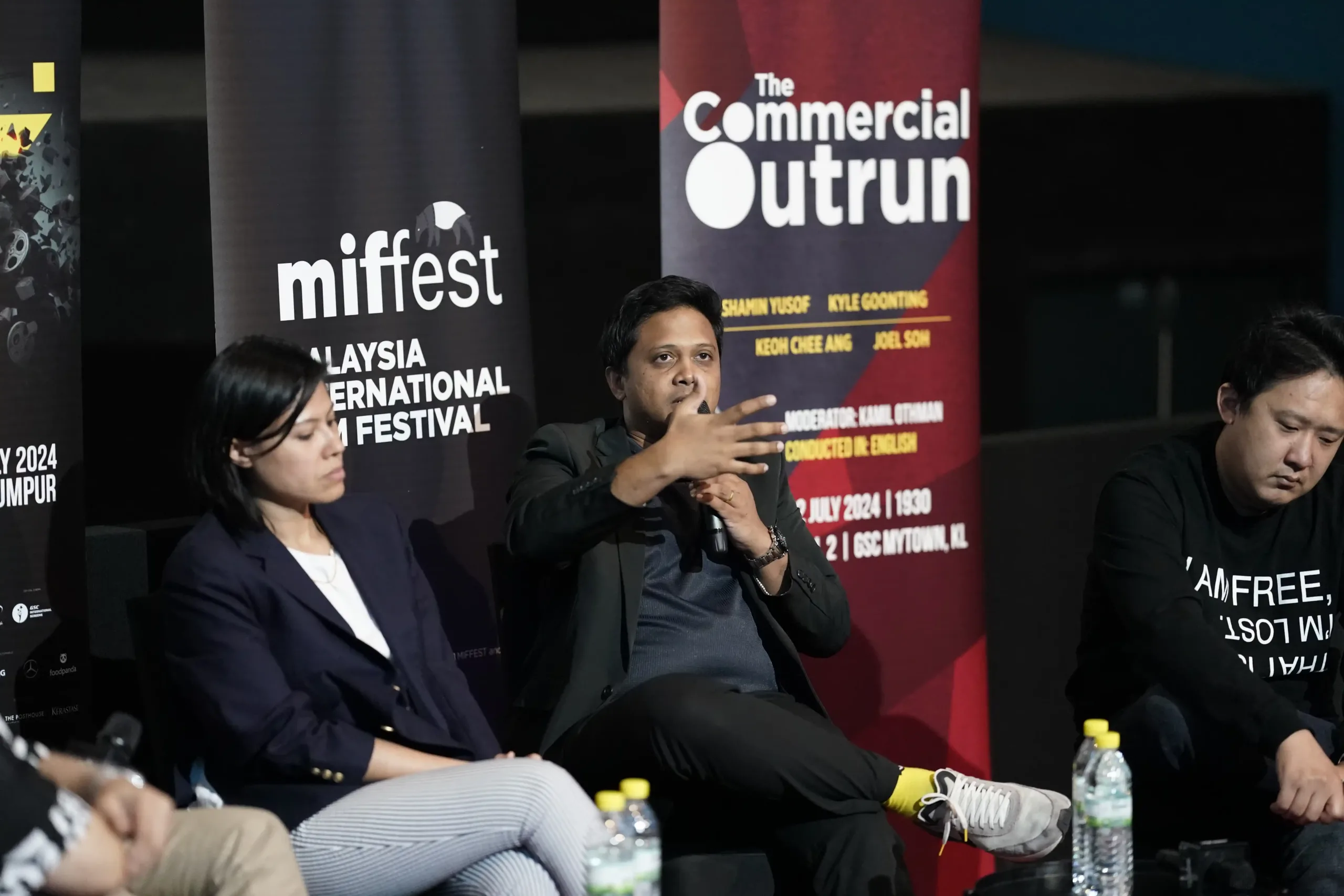KEY TAKEAWAYS: THE COMMERCIAL OUTRUN

Kamil Othman, Keoh Chee Ang, Shamin Yusof, Kyle Goonting and Joel Soh.
SPEAKER(S)
Shamin Yusof
Shamin Yusof is the managing director of Skop Productions, a leading film production company in Malaysia. Under her leadership, Skop Productions has produced numerous successful films and television dramas, such as “Polis Evo,” “Abang Long Fadil 2,” “KL Special Force,” and “Misteri Dilaila.”
Joel Soh
Joel Soh is a prominent Malaysian film producer known for his impactful contributions to the local film industry. He gained significant recognition for producing the hit movie “Polis Evo,” which has become one of Malaysia’s most successful action films. With a keen eye for storytelling and production, Joel has carved out a notable career in film production, consistently delivering high-quality content that resonates with audiences
Keoh Chee Ang
Passionate filmmaker, venture in the entertainment line for 14 years, produced numerous local and international films, Malaysia locally produced dramas, TV programmes, commercials, Chinese New Year album, concerts, managing artiste. Besides contributing the era of building up local Chinese movies for the past decade, he also is the produced Malaysia First ever mIlitary box office movie PASKAL, after working with Malaysia Navy, he continued his journey and produced another Air Force Movie.
Kyle Goonting
Kyle Goonting is a Malaysian film screenwriter, creative development, supervising and creative producer. He is currently the head of production & development in Astro Shaw, the company he worked for since Polis Evo production. He is also one of the key people for the Polis Evo franchise alongside Joel Soh and Anwari Ashraf. He was also the co-creator and a founding member of Blackflag, a Malaysian film company.
MODERATOR
Kamil Othman
Kamil Othman is the Chairman of the National Film Development Corporation Malaysia (FINAS) since February 2023. He previously served as CEO of FINAS from 2014 to 2016 and has held various positions in the media industry. Kamil focuses on enhancing funding, marketing, and capacity building in the Malaysian film sector.
The Malaysian film industry, though vibrant locally, faces significant challenges in its journey to break into the global market. The industry, spearheaded by various passionate filmmakers, is at a crossroads, attempting to strike a balance between commercial success and cultural expression. This article explores the key challenges, opportunities, and strategies discussed by prominent figures in the industry, focusing on their efforts to export Malaysian films to international markets.

Joanne Goh and Kamil Othman.
Striving for Global Recognition
Malaysia’s film industry has seen success at international festivals, but the global market remains elusive. Filmmakers such as Keoh Chee Ang, Shamin Yusof, and Kyle Goonting share a common dream—to see Malaysian films as household names across the world. However, several barriers prevent this from becoming a reality. As Shamin highlighted, despite some successes like “Munafik” by Syamsul Yusof performing well in Indonesia, Malaysian films often struggle to penetrate markets beyond Southeast Asia.
One of the key obstacles lies in understanding cultural differences between neighbouring countries. For instance, Indonesian audiences largely prefer horror films, making it difficult for Malaysian action or comedy films to gain traction. Even successful Malaysian franchises like “Police Evo” and “Abang Long Fadil” have faced challenges in achieving widespread appeal, indicating the need for careful selection of films to export.
Distribution and Exportability
A crucial aspect of a film’s success abroad is its distribution strategy. Kyle Goonting of Astro Shaw emphasizes the importance of considering global sales agents from the very beginning of a film’s production. International distributors need to find a film “sexy” enough to invest in, meaning it must have broad appeal beyond Malaysia. Films with strong action elements and high production values, such as “War on Terror: KL Anarchy” by Kroll Azry and Frank See, tend to perform better internationally because they rely less on localized content and more on universal themes.
However, Malaysia’s limited film production scale compared to countries like Indonesia hampers the ability to experiment and take risks. Kyle points out that Malaysia lacks the infrastructure and resources to conduct large-scale trials with films, making it harder to engineer content for export. The success of “Bad Genius” by Nattawut Poonpiriya from Thailand, which was not a top film domestically but became a global hit, serves as a benchmark for what Malaysian filmmakers aspire to achieve.

Keoh Chee Ang.

Shamin Yusof and Kyle Goonting.
The Franchise and Branding Challenge
The “Police Evo” franchise is one of Malaysia’s notable examples of a local success story attempting to branch out globally. However, maintaining both local and international appeal has proven difficult. The changing tastes of local audiences, along with the lack of international recognition for Malaysian actors and filmmakers, poses a significant hurdle. As Kyle explains, Malaysian artists are still relatively unknown outside the country, making it hard to sell films based on star power alone.
Furthermore, filmmakers struggle to find a formula that allows them to comfortably recoup their investments locally while also having the courage to take their films abroad. As a result, the industry remains stuck in a “chicken and egg” situation, unable to risk substantial investments in hopes of global success.
The Role of Cultural Identity and Government Support
One major topic of discussion is the need for a unique Malaysian identity in films. While countries like Thailand and Indonesia have successfully branded their films with distinct cultural elements, Malaysia still grapples with defining what its films represent on the global stage. This identity crisis, combined with limited government support for international promotion, has left filmmakers wondering how to position Malaysian cinema for export.
Despite these challenges, there is optimism. Filmmakers believe that with the right collaboration between the government, film councils, and international distributors, Malaysia could develop the infrastructure needed to support films aimed at global audiences. The hope is that one day, a Malaysian film will achieve universal commercial success, paving the way for future filmmakers to follow.

Kamil Othman.
The Malaysian film industry is at a critical juncture, with filmmakers eager to see their work succeed beyond local shores. To achieve this, they must navigate a complex web of cultural, logistical, and financial challenges. Success lies in creating content that transcends local barriers while appealing to global audiences, backed by strategic distribution and international collaboration. Only then can Malaysia take its place on the global cinematic stage.









